Icebreaker Interview Questions
These are the first step in interviews to move toward questions related to the job.
What Are Icebreaker Interview Questions?
The icebreaker questions assist the employer in opening the interview with candidates and gradually moving on to job-specific topics.

These questions provide a helpful beginning start for the interview journey and aid in creating a favorable initial impression, even if it is doubtful that you would pick a person entirely based on their answers to these questions.
In addition to being light-hearted and informal, these inquiries facilitate faster communication between you and your staff. By investing the time to interact with them in this manner, you indicate that you are concerned about employees beyond the office.
Icebreaker questions are an excellent approach to enhancing your recruitment and assimilation processes. Some human management software even allows you to question newly hired staff during recruitment.
Nothing makes an interviewer more uneasy than a candidate who panics and has frightened, glazed eyes. Worried candidates will not portray themselves in their genuine light and will refrain from sharing their professional experiences.
The icebreaker interview questions may help both the interviewer and the candidate ease. However, interviewers must find a means to breach these barriers even if the question is relatively foreseeable.

While some people can make a candidate feel at ease with their actions, others will try to establish a rapport by having a quick conversation and asking a few icebreaker questions.
Although these icebreaker questions may sound silly, applicants should be cautious about how their replies could be taken. Only a small percentage of interviewers will take the responses seriously, yet that is sufficient justification for a thoughtful response.
Because each individual is unique, we cannot reasonably respond to these questions; however, we can offer some suggestions on how you can build your various responses.
NOTE
Be brief and concise in your responses. A funny inquiry necessitates a quick and insightful response.
How should you employ the Icebreaker Interview Question?
A candidate must be able to spot an icebreaker question so that they can respond more confidently. It's never a good idea to respond seriously to a question intended to ease your anxiety and open the lines of communication.
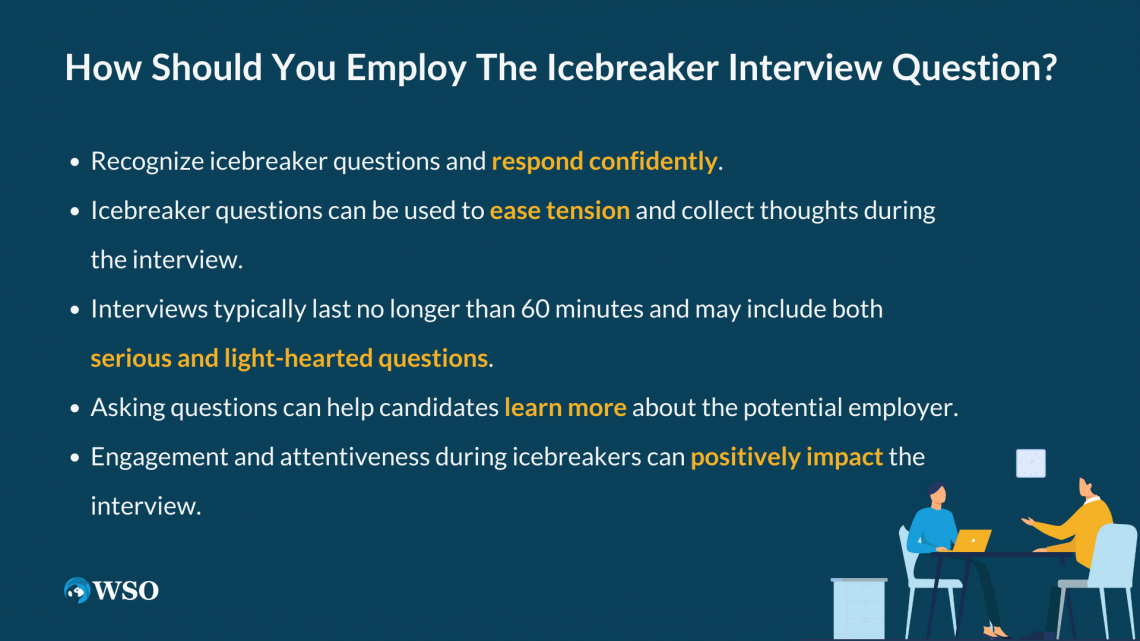
The hiring manager may ask an icebreaker question if the interview is getting a little heated and they need to collect their thoughts. There will be no interviews that go above 60 minutes.
The talk will have highs and lows, with icebreakers intermingled among the significant questions, so the higher your attention is, the better you excel in the interview.
By politely asking a few questions during the interview, candidates may learn much about their potential employer rather than wasting time discussing other topics. Of course, every conversation should be two-way, so feel free to join if the environment appeals to you.
Icebreakers have long been utilized for workplace bonding events, so be empathetic and attempt to respond favorably to them.

They ask to demonstrate a different side of themselves to you. A question's response isn't always the only thing that matters. An icebreaker question might help to lighten the mood and calm the candidate.
Since there will likely be many important questions, a light-hearted query is appropriate here. The interviewer won't criticize your response and isn't trying to catch you unaware.
In this article, we'll go over several icebreaker topics. Unfortunately, there is no indication of the potential context in which they may occur. This is up to each hiring manager to determine.
Even the most senior personnel may see the practice of addressing some of the most basic inquiries.
Topics for icebreaker questions
Each interview begins with a few opening questions to break down language barriers and build rapport. However, don't exclude unexpected queries to break the ice, even if some of these questions are work-related and debated.
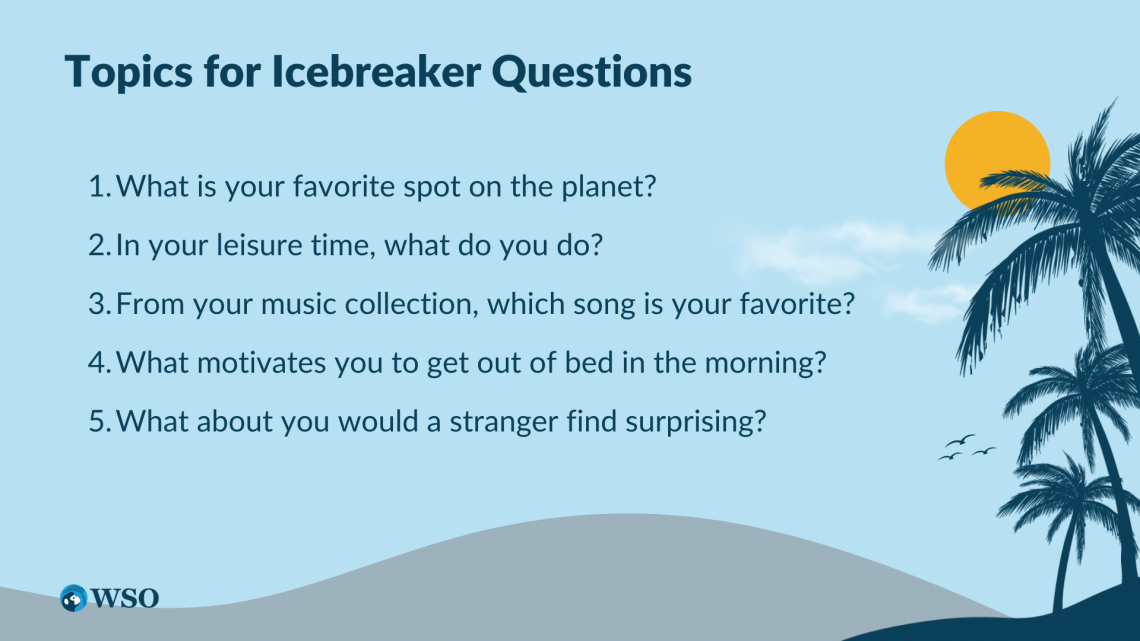
The examiners simply like to get to recognize you, so none of the inquiries need to be very serious. However, your reaction should be spontaneous and sincere to be taken seriously. Offer your comment based on the first thought that enters your head. These tests aren't exactly rigorous.
- What is your favorite spot on the planet?
- In your leisure time, what do you do?
- From your music collection, which song is your favorite?
- What motivates you to get out of bed in the morning?
- What about you would a stranger find surprising?
Intriguing Topics
A job interview is a stressful experience, so the amusing questions to break the ice are designed to relax the atmosphere and lower stress levels. They are not there to judge you, and your responses will not be excessively scrutinized.
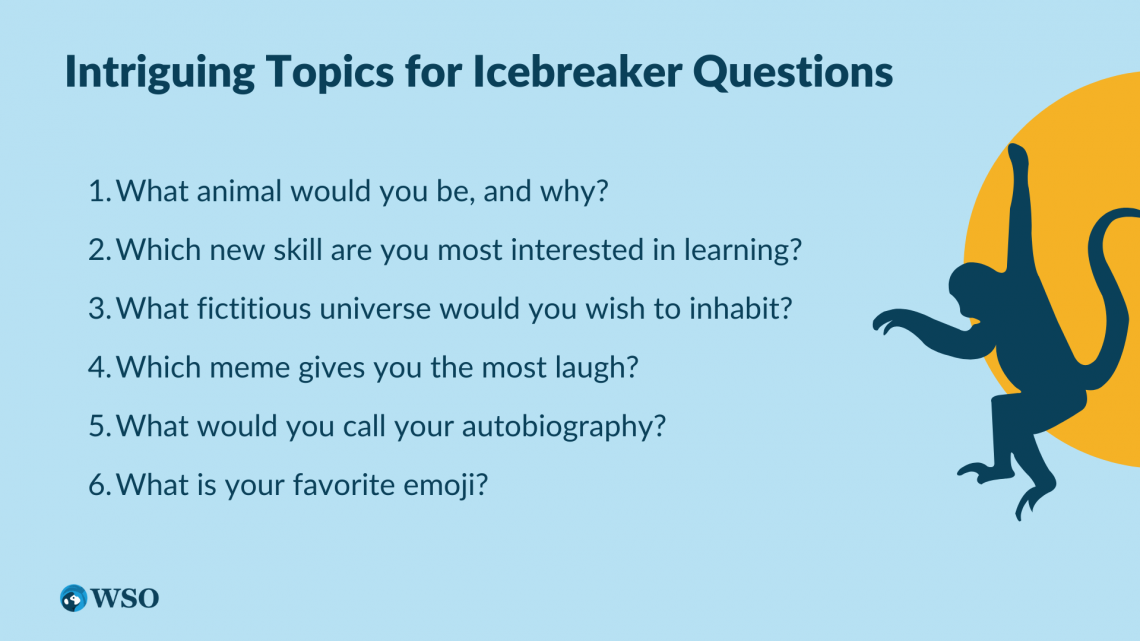
Examiners just want to know what you're thinking. These may be icebreaker queries for professionals, but sometimes you simply need to unwind. The examiner will respect your time and make sure you feel comfortable.
Allow yourself to be carried by the stream. Then, with a smile on your face, you can answer a funny question but try to contain your laughter so that your interlocutor will laugh ahead of you.
- What animal would you be, and why?
- Which new skill are you most interested in learning?
- What fictitious universe would you wish to inhabit?
- Which meme gives you the most laugh?
- What would you call your autobiography?
- What is your favorite emoji?
Potential Topics
A magical fantasy world is something that everyone likes entering. These hypothetical situations will show potential employers what your imagination is capable of, which is a valuable ability for many professions.
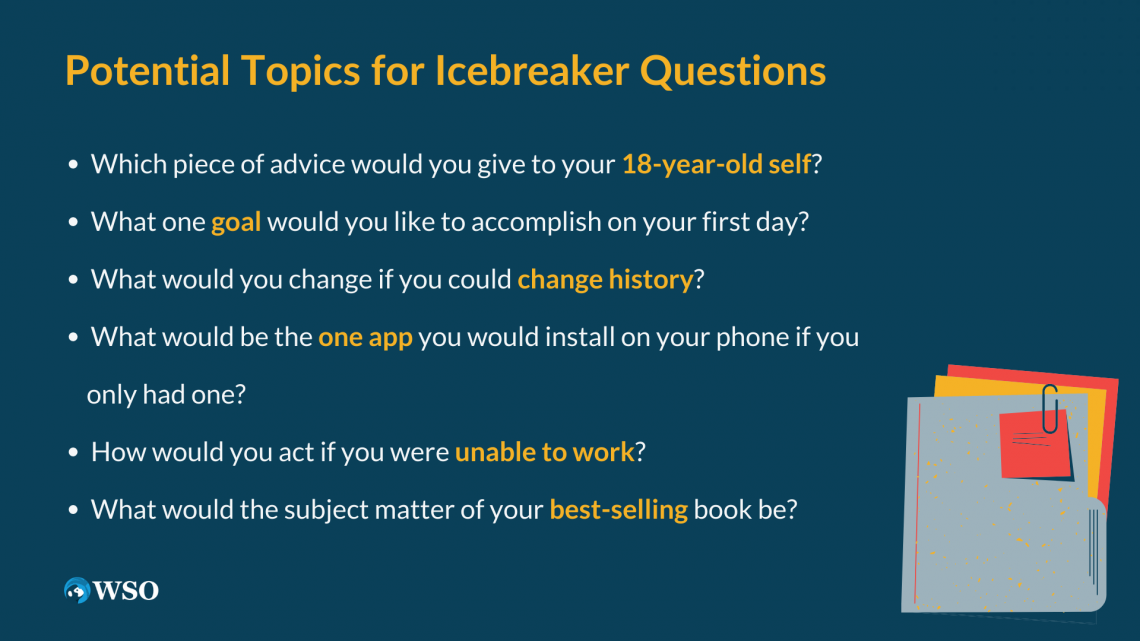
Consider your replies carefully since many of these questions will reveal important characteristics of your personality. Therefore, it's important to think carefully about this query.
The person interviewing you means to ask you a big question; therefore, even if the question is simple, answer it as if you are thinking about it.
- Which piece of advice would you give to your 18-year-old self?
- What one goal would you like to accomplish on your first day?
- What would you change if you could change history?
- What would be the one app you would install on your phone if you only had one?
- How would you act if you were unable to work?
- What would the subject matter of your best-selling book be?
Related To Work Topics
In a job interview, the bulk of the questions will be about your potential for success at work. However, a group of icebreaker inquiries has a tenuous connection to your future position.
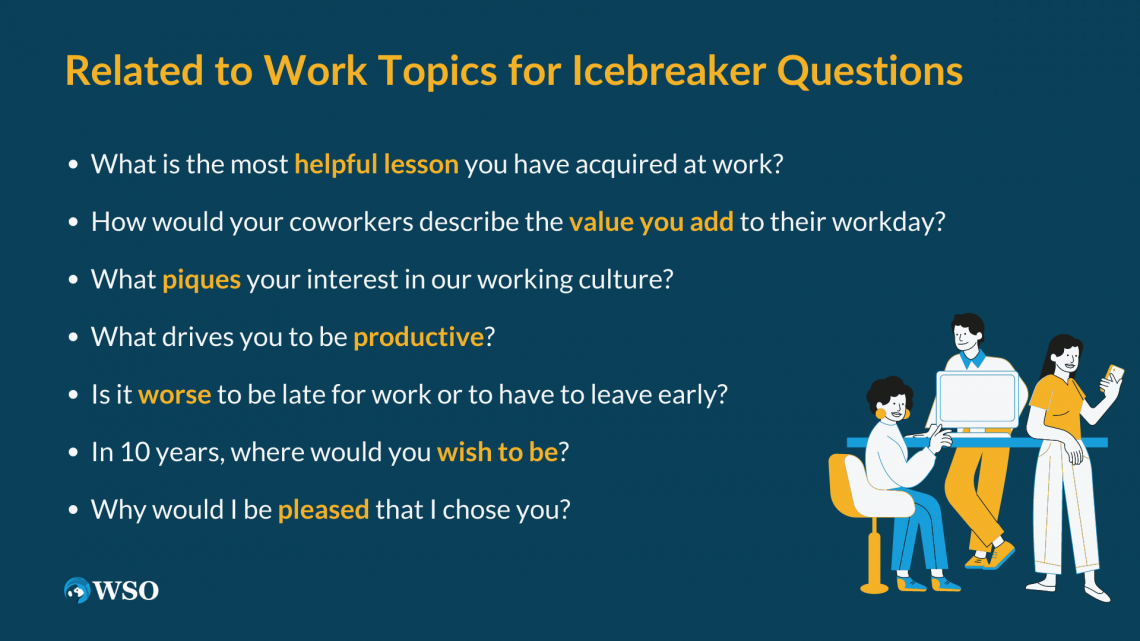
While responding, remember how your answer will be received, even if you shouldn't take yourself too seriously. Consider the possible workplace climate and culture. How could your potential coworkers react to these questions?
Stay true, but modify your reaction to match the environment. Something that was okay in the previous workplace may not be acceptable in the current one.
- What is the most helpful lesson you have acquired at work?
- How would your coworkers describe the value you add to their workday?
- What piques your interest in our working culture?
- What drives you to be productive?
- Is it worse to be late for work or to have to leave early?
- In 10 years, where would you wish to be?
- Why would I be pleased that I chose you?
Choose An Option Topic
A question with two possible answers is deceptive, especially if the interviewer restricts you from explaining. However, they will form a strong impression if they ask these questions frequently throughout the interview.
In one phrase, provide a succinct response and a brief explanation. Often a hiring manager may provide a novel question to get a sense of how you think. Clarifying your response will give the employer more information about your answer.
- Would you rather visit a museum or go to the beach?
- Which would you prefer: going back in time or going forward?
- Which would you choose to give up, your laptop or your smartphone?
- Would you rather be able to get away with telling lies all the time or catch every lie you hear?
- Which would you prefer—to be criticized or ignored?
When responding to these questions, the interviewee often has two options. Based on this decision, the interviewer can infer the major characteristics of the employee's character.
One-word Responses To Questions
A bombardment of one-word icebreaker questions is a frequent strategy during certain interview segments since some recruiters are short on time for long responses.
The candidate gets a break from talking so much, and the questions are quite illuminating on both sides due to their focus. In any interview, you must strictly adhere to the guidelines. Engage in the activity and show sportsmanship.
You'll never fully understand the interviewer's thoughts. So keep it straightforward; the interviewer will value it.
- In a word, sum up your professional identity.
- In a nutshell, how are you feeling right now?
- What keyword do you want me to recall you by?
- What one word best describes your professional aspirations?
- What one word terrifies you the most?
From this kind of icebreaker question, we can see that the needed response, which is one word, is a little bit difficult for the candidate and would necessitate some serious concentration.
The Challenging Questions
Certain icebreaker inquiries are too difficult to answer. So answer honestly, but don't be too provocative. Be as succinct as possible, and don't spend time justifying what you're saying.
A job interview with many unfavorable questions might be a warning indicator.
Most of these statements are meant to catch you off guard. If the line of inquiry is repeatedly negative, you should consider whether this is the type of person you want to work with.
- What is your most glaring weakness?
- What aspect of your personality do your coworkers despise?
- What attributes does a bad boss have?
- When tension overflows its boundaries, what do you do?
- What would you use as an excuse if you had to call in sick?
- When was the last time you were unfairly criticized?
NOTE
Thus, these icebreaker questions are distinguished by a degree of trickery, with candidates answering rumbling, disconnected replies. The best course of action is to prepare for this inquiry in advance.
What to avoid asking as icebreaker queries
Although icebreaker questions are just a tiny portion of the interview, they help to establish the tone for a thorough evaluation.
As a result, you should avoid the following:
1. Unexpected inquiries.
Competent applicants will most likely be prepared to answer standard interview questions. Unexpected questions that are unconnected to the job may confuse and frighten candidates.
2. Inappropriate or too personal inquiries
While you may want to appear nice and approachable, it is essential to remain cautious.
3. Prompt inquiries.
There's nothing wrong with cutting through the small talk and getting right to the topic. However, queries such as "What are your wage expectations?" do not present a positive picture and should be addressed sooner in the hiring process.
Inquire, "What do you enjoy most about your job?"
Difficult questions and icebreaker questions are designed to alleviate uneasiness. Opening the interview process with brainteasers or difficult questions will likely increase tension and negatively impact candidates' performance. Leave these sorts of interview questions for later.
Although there is specific anti-discrimination legislation in every country, it is generally prohibited to ask someone about their age, religion, family status, children, gender identity, or ability.
Do not feel compelled to respond to inquiries of this nature. The interviewer will get the point and move on if you just say, "I would choose not to answer this." The interviewer probably made a mistake in asking.
The foundation of a psychologically secure workplace is knowing your limits. Any honorable employer ought to respect this. If, during the interview, a question that is against the law is asked, respectfully decline to respond.



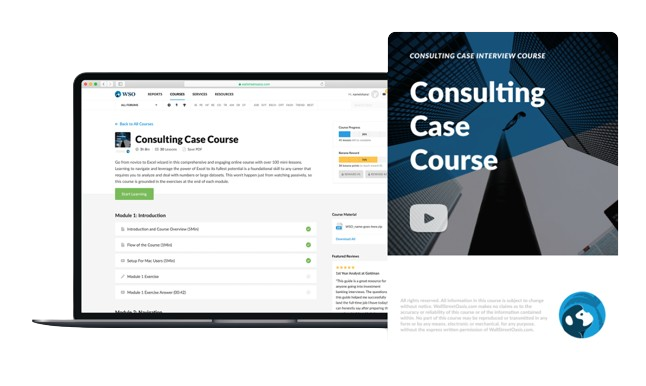

or Want to Sign up with your social account?